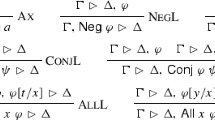Abstract
The main contribution of this paper is an effective proof of the well-foundedness of MPO, as a term of the Calculus of Inductive Constructions. This proof is direct, short and simple. It is a sequence of nested inductions and it only relies on the fact that the multiset order, restricted to a well-founded part of the base set, is well-founded. In particular, it does not require to establish preliminarily the transitivity of the relation, although we prove it as an additional property. The terms we consider are not supposed to be ground nor the signature to be finite. All the proofs have been carried out in the Coq proof-assistant.
Similar content being viewed by others
References
Baader F., Nipkow T. (1998) Term Rewriting and All That. Cambridge University Press, New York
CoLoR: a Coq Library on Rewriting and termination. http://color.loria.fr
Coquand T., Huet G. (1985) Constructions : A Higher Order Proof System for Mechanizing Mathematics. EUROCAL 85. LNCS, vol. 203. Springer, Berlin Heidelberg New York
Coupet-Grimal, S., Delobel, W.: A Constructive Axiomatization of the Recursive Path Ordering (Submitted, 2006)
Dawson, E., Goré, R.: A general theorem on termination of rewriting. In: Computer Science Logic, CSL’04, no. 3210 in LNCS, pp. 100–114. Springer, Berlin Heidelberg New York (2004)
Dershowitz N. (1982) Orderings for term rewriting systems. Theor. Comput. Sci. 3(17):279–301
Ferreira, M., Zantema, H.: Well-foundedness of term orderings. In: 4th International Workshop on Conditional Term Rewriting Systems (CTRS’94), no. 968 in LNCS, pp. 106–123. Springer, Berlin Heidelberg New York (1995)
Giménez, E.: Un calcul de constructions infinies et son application à la vérification de systèmes communicants. Thèse d’université, Ecole Normale Supérieure de Lyon (1996)
Girard, J.Y., Lafont, Y., Taylor, P.: Proofs and types. Cambridge Tracts in Theoretical Computer Science, vol. 7 (1988)
Huet, G., Lankford, D.: On the uniform halting problem for term rewriting systems. Technical Report 283, IRIA (1978)
Jouannaud, J.P., Rubio, A.: The higher-order recursive path ordering. In: Proceedings of the 14th annual IEEE Symposium on Logic in Computer Science (LICS’99), pp. 402–411. Trento, Italy (1999)
Jouannaud, J.P., Rubio, A.: Higher-Order Recursive Path Orderings a la carte. Technical Report. http://www.lix.polytechnique.fr/Labo/Jean-Pierre.Jouannaud/biblio.html (2003)
Koprowski, A.: Well-foundedness of the Higher-Order Recursive Path Ordering in Coq. Master thesis, Free University of Amsterdam (The Netherlands) and Warsaw University (Poland) (2004)
Kruskal J. (1960) Well-quasi-ordering, the tree theorem, and Vazsonyi’s conjecture. Trans. AMS 95, 210–225
Leclerc, F.: Termination proof of term rewriting system with the multiset path ordering. A complete development in the system Coq. In: TLCA, pp. 312–327 (1995)
Lescanne P. (1982) Some properties of decomposition ordering, a simplification ordering to prove termination of rewriting systems. R.A.I.R.O. Theor. Inform. 14(4):331–347
Nash-Williams C.S.J.A. (1963) On well-quasi-ordering finite trees. Proc. Camb. Philos. Soc. 59(4):833–835
Nipkow, T.: An Inductive Proof of the Well-foundedness of the Multiset Order. Due to Wilfried Buchholz. Tech. rep. http://www4.informatik.tu-muenchen.de/~nipkow/misc/index.html (1998)
Paulin-Mohring, C.: Définitions inductives en théorie des types d’ordre supérieur. Habilitation à diriger les recherches, Université Claude Bernard Lyon I (1996)
van Raamsdonk, F.: On termination of higher-order rewriting. In: Proceedings of the 12th International Conference on Rewriting Techniques and Applications (RTA’01), pp. 261–275. Utrecht, The Netherlands (2001)
Seisenberger, M.: Kruskal’s tree theorem in a constructive theory of inductive definitions. In: Schuster, P., Berger, U., Osswald, H. (eds.) Reuniting the Antipodes—Constructive and Nonstandard Views of the Continuum, Symposion in San Servolo/Venice, Italy, May 17–22, 1999 (Synthese Library 306, Kluwer, Dordrecht, 2001)
Team, T.C.D.: The Coq Proof Assistant Reference Manual—Version 8.0. Tech. rep., LogiCal Project-INRIA (2004)
The Coq Proof Assistant. http://www.coq.inria.fr
Veldman W. (2004) An intuitionistic proof of kruskal’s theorem. Arch. Math. Log. 43(2):215–264
Author information
Authors and Affiliations
Corresponding author
Additional information
Laboratoire d’Informatique Fondamentale de Marseille, UMR 6166.
Rights and permissions
About this article
Cite this article
Coupet-Grimal, S., Delobel, W. An effective proof of the well-foundedness of the multiset path ordering. AAECC 17, 453–469 (2006). https://doi.org/10.1007/s00200-006-0020-y
Received:
Revised:
Published:
Issue Date:
DOI: https://doi.org/10.1007/s00200-006-0020-y




